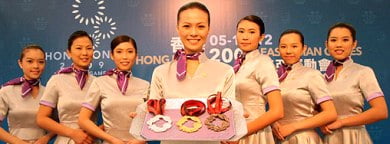Will Hong Kong’s pro-democrats be dumb enough to let Beijing split them over whether to accept a promised future deal in exchange for supporting a constitutional reform package for 2012 that changes nothing? It is not necessarily a rhetorical question, like an enquiry about the Pope’s religion or the toilet habits of forest-dwelling bears. It should be obvious by now to the entire spectrum of pro-democrats that ‘gradual and orderly progress’ towards universal suffrage is in fact a succession of bait-and-switches and empty promises.
The first two rounds of political reform after 1997, spelt out in the Basic Law annexes, expanded the proportion of democratically elected seats in the Legislative Council to half. This, combined with the executive branch’s loss of respect generally among lawmakers, has forced administration officials to work harder lobbying and cajoling legislators to get bills passed and funding approved. But that was the full extent of any redistribution of power.
Any further increase in the proportion of democratically elected seats could shift the balance more seriously. For example, the administration might find itself forced into boosting social welfare spending in order to get an annual budget approved. That is why the third round of reform proposed in 2005, intended to apply in 2008, offered no real change. And it is why the suggested arrangements for 2012 won’t either, even if they appear more substantial. Democratization of the legislature has gone as far as it can go without putting ‘executive-led government’ in peril – in other words, theoretically endangering the Chinese Communist Party’s absolute control, as exercised through appointment of a chief executive with a pliant legislature.
Where selection of the chief executive is concerned, there has been no substantive change whatsoever since 1997. As things currently stand, 220,000 citizens supposedly drawn from a representative range of social and economic sectors elect 800 members of an election committee. Because of the discriminating selection of sectors and their uneven weightings, the result is an overwhelmingly loyalist electoral college, which rubber-stamps Beijing’s choice of chief executive in a ridiculous charade that even the overseas press, to their shame, take semi-seriously.
It is perfectly possible to increase these figures – turn 800 into 1,200 or 1,600, for example – while changing nothing at all in practice, though such a rigged system looks less and less convincing as the numbers rise. Yet Beijing has conceded a possibility of full universal suffrage – involving all 3.4 million registered voters – in the next CE election but one, in 2017. If so, and if we are talking direct election, the question is: what number is x, in the progression
800 (2008), x (2012), 3,400,000 (2017)?
Or, if we are going the indirect, electoral college, route, what number is x in the progression
220,000 (2008), x (2012), 3,400,000 (2017)?
If x, in the proposals for expanding involvement in the 2012 CE election, is not a number making up significant ground between the 2008 and 2017 figures, it should be finally, abundantly, unambiguously clear to even the most obtuse pro-democrats that they are being strung along. And a minor tweaking, say raising 800 to 1,600, is more than likely. (This all disregards structural and procedural details – another dimension of vote-rigging altogether.)
Yet some members of the pro-democratic camp are distinctly more flexible than others, and some could potentially be lured by a vague promise of talks. Unless they all hang together, an empty, non-reform package will get through, and Beijing will have satisfied its need to appear to be moving forward without freeing Hong Kong from the grip of its ruling clique of bureaucrats and tycoons.
The deal is: if you don’t ask for democracy, you won’t get it; and if you do ask, you won’t get it either. Ideally, the imminent public consultation on reform will convince the pro-democrats once and for all of this, and they will take the fight somewhere more useful – like a land system that is pretty much designed to force Hong Kong’s middle class to divert a big share of their lifetime’s earnings to half a dozen families via the rigged property market. Nothing more pleases our local self-styled elites than the sight of pan-democrats banging their heads against the universal suffrage wall year after year after year.
On a more serious note, a group of pert but perhaps potentially ferocious young ladies have unveiled the honours that will be awarded to the top athletes at the East Asian Games. The ancient Greeks, of course gave the winners olive wreaths, and in the early modern Olympics, victorious sportsmen received little gifts like umbrellas. Since then, it has become the norm to hand out medals made of gold, silver and bronze.

 The Hong Kong games, however, will feature a far more creative sort of prize altogether: squashed doughnuts. It is a long story, going back to the closure of the Big Lychee’s Krispy Kreme outlets last year, involving a collision between a steamroller and a container full of the failed franchise’s coconut-, lemon- and chocolate-flavoured inventory. And there I was, thinking the East Asian Games couldn’t get any more exciting!
The Hong Kong games, however, will feature a far more creative sort of prize altogether: squashed doughnuts. It is a long story, going back to the closure of the Big Lychee’s Krispy Kreme outlets last year, involving a collision between a steamroller and a container full of the failed franchise’s coconut-, lemon- and chocolate-flavoured inventory. And there I was, thinking the East Asian Games couldn’t get any more exciting!
